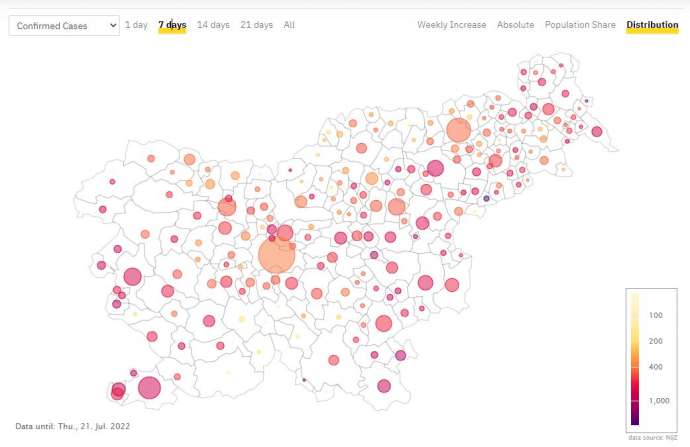STA, 22 July 2022 - As Covid figures have been increasing again in Slovenia, the Covid-19 task force recommended on Friday that face masks be again introduced in all indoor public spaces and that they become obligatory in the health system again. Vulnerable groups and those over 60 have been urged to work from home and get vaccinated.
"We ask employers to enable that and decision makers to create the legal basis for working from home," the group's head Mario Fafangel told the press. He stressed this was the basis for long-term co-existing with the virus.
All vulnerable groups and those over 60 years old are strongly recommended to use face masks when distancing is not possible. Masks are also recommended for all in indoor spaces such as public transport, shops, cinemas, he said.
The task force also called for masks to again become obligatory indoors in hospitals, community health centres, pharmacies, care homes and other social care institutions. Many of these institutions have already made mask wearing mandatory themselves.
Fafangel said that the epidemiological situation in Slovenia was improving and that the reproduction number was slowing approaching one, meaning that one infected person on average still infected more than one person.
The number of infections in this summer wave will peak next or perhaps even this week, he said. Then the curve could stagnate for a while before turning downwards in the best case scenario, he said.
Infectious disease expert Mateja Logar said rapid antigen test were currently used to confirm infections, while in the coming weeks PCR testing would be enhanced, as it enables further sequencing to determine the sub-variant of the virus.
Persons with Covid symptoms must stay home for seven days since the start of the symptoms. If the person tests negative after seven days, the isolation ends.
Logar stressed the importance of early detection of the disease, as the drugs available, remdesivir and paxlovid, are effective in preventing complications if taken early enough.
Currently, about 10% of beds are available for Covid patients in 15 Slovenian hospitals, according to the head of the task force coordinating Covid hospitalisations, Matjaž Jereb. He said the most problematic were patients treated for other conditions who get infected with coronavirus.
Calculations show that hospitalisations should peak in mid-August. "Let's hope that the pressure on hospitals will nevertheless be lower in the coming weeks," he said.
Health Minister Danijel Bešič Loredan said all measures would be introduced in cooperation with experts and presented to the public. No measure will be introduced overnight, he said.
"We want to prepare an open model, which Omicron currently allows for, but we must protect the vulnerable groups. We will strive to keep both our society and health system open," he said.
He announced the government would prepare an emergency Covid law to help manage the epidemic and its consequences. The bill will be sent to the Economic and Social Council next month, and will be passed in September, he said. It will be retroactive, taking effect from the start of July until the end of next year, he said.
Plans are also being made within the task force for the new school year. Gregor Pečan, a member of the subgroup for education, said the idea was to address the main challenges by autumn, so that school work could be conducted like in pre-pandemic times.







